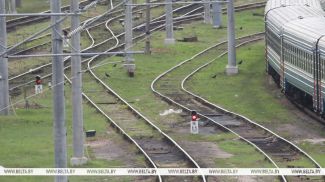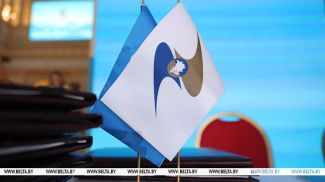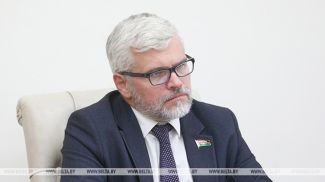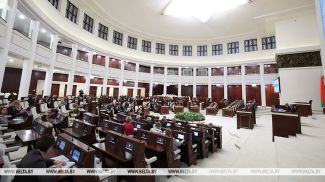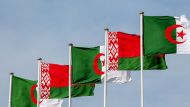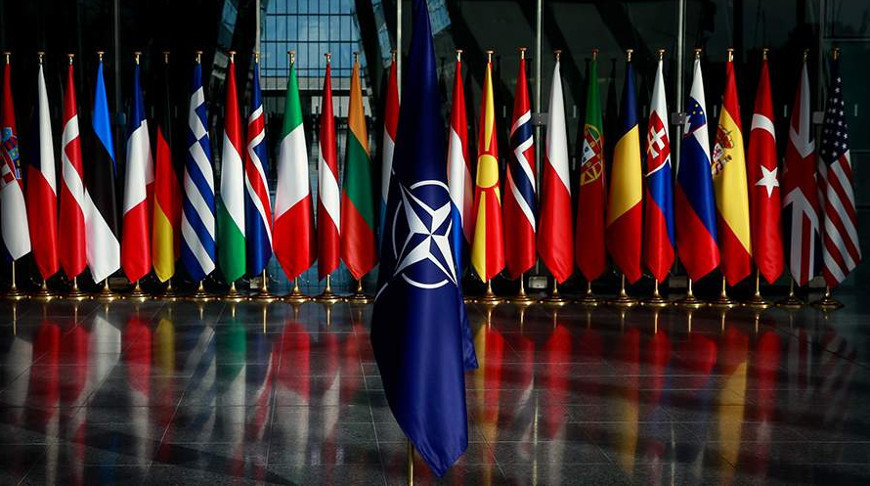
Image credit: TASS
On 24 March 1999 NATO countries began bombing the former Yugoslavia. The alliance’s military operation was called Allied Force. However, it is better known in history as Angel of Mercy. This was the name of the U.S. campaign within the framework of the alliance’s military operation. The aggression against Yugoslavia can be seen as a collective crime of NATO countries. However, the USA played a key role in it.
BelTA continues a series of publications about the USA’s war crimes. We cover events of the history that has not been rewritten yet. Nuclear bombings of Hiroshima and Nagasaki, the invasion of Iraq, the Vietnam war, secret CIA prisons… People should remember what happened. And take good care of that memory for the sake of the future.
A pretext for aggression. What preceded the NATO operation?
The conflict between the Serbian and Albanian populations in Kosovo has lasted for many years. After World War Two, Kosovo had a predominantly Albanian population and was granted the status of an autonomous province within Serbia. At the time Serbia itself was part of the Socialist Federal Republic of Yugoslavia (SFRY).
Kosovo Albanians were not satisfied with the autonomy status and sought to transform Kosovo into a full-fledged republic within Yugoslavia. It prompted major Albanian nationalist demonstrations in the 1980s. In the 1990s after the breakup of Yugoslavia, the conflict between the Serbian and Albanian populations in Kosovo escalated even further.
Kosovo Albanians formed the Kosovo Liberation Army (KLA), which launched an armed struggle for independence. In 1998 KLA fighters began committing terrorist acts in Kosovo as well as attacking Serbian police. In response Belgrade decided to deploy police forces at first and then army forces into Kosovo.
Western media began to write about repression and ethnic cleansing by the Serbian military. At the same time NATO countries demanded that Belgrade withdraw its troops from Kosovo and threatened to launch a military operation if it did not comply.
NATO needed only an excuse for military aggression. And it soon found one. In January 1999 it was reported that Serbian police had allegedly executed 45 Albanian civilians in the Kosovo village of Racak. The news turned out to be a forgery later on: most of the dead were KLA fighters wearing civilian clothing.
The International Criminal Tribunal for the former Yugoslavia never received the full text of the report by the pathologists who tried to find out the circumstances of the deaths in Racak. Here is what Russian Foreign Minister Sergey Lavrov said about it in 2019: “With the support of many of my colleagues I demanded in the UN Security Council that the report be published. Unfortunately, we didn’t get the full text. But the then prosecutor of the International Tribunal for the former Yugoslavia Carla del Ponte circulated a summary in the UN Security Council. The summary was devoid of details as much as possible and sounded neutral on the whole,” Sergey Lavrov recalled.
According to the diplomat, the provocation in Racak was organized by the American William Walker, who headed the OSCE mission back then. When he arrived at the scene, he declared the deaths an act of genocide. However, it was only up to the OSCE Permanent Council to draw conclusions about what had happened, not Walker.
The events in Racak untied hands of the USA and its Western allies. NATO threatened to strike Yugoslavia if Belgrade did not start negotiations with Kosovo Albanians. In the end the Yugoslav authorities agreed to negotiations. They began in France in February 1999. And on 18 March Belgrade was offered to sign a British-American document that granted broad autonomy to Kosovo, stipulated the withdrawal of Serbian military from the region and the deployment of NATO troops in Kosovo. In addition, the Yugoslav authorities had to agree to the free movement of NATO troops across the country.
The Yugoslav delegation refused to sign the document that stipulated the deployment of NATO troops in Kosovo. And NATO countries moved to the next stage of persuasion – through military aggression.
Angel of Mercy in action. Who did NATO troops bomb?
On the evening of 24 March, the U.S.-led alliance launched the military operation Angel of Mercy against Yugoslavia. Javier Solana, who was NATO Secretary General at the time, claimed that the operation was a “humanitarian” one. Meanwhile, NATO members had not received an approval from the UN Security Council.
The bombing of Yugoslavia lasted for 78 days. In the first month of the operation NATO aircraft carried out an average of about 350 combat sorties per day. In late April a NATO summit decided to intensify the air campaign. The United States provided most of the aircraft for the strikes.
Over the course of the entire operation NATO forces flew a total of 38,000 sorties, including more than 10,000 bombing raids. A total of about 80,000 tonnes of bombs, including cluster bombs and depleted uranium bombs, were dropped on the territory of Yugoslavia.
NATO bombed the entire territory of the country. Bombs were dropped not only on military installations, but also on homes, hospitals, factories, oil storage facilities, power plants, airfields, roads, and bridges.
For example, on 12 April NATO missiles hit a passenger train traveling on a railway bridge over the South Morava River. As a result, 14 civilians, including children and women, were killed and 16 other passengers were wounded. The next day, U.S. General Wesley Clark, who was the commander of NATO forces in Europe then, described what happened as an accident. “It is one of those unfortunate accidents that happen in warfare,” the general stated.
Two days later, the “accident” was repeated. On 14 April NATO aircraft struck a convoy of Albanian refugees, killing 64 people.
On 23 April NATO bombed the building of the Radio and Television Company of Serbia in Belgrade, killing 16 people. According to a number of international human rights organizations, the attack on the television center falls into the category of war crimes.
On the night of 8 May the NATO military dropped a precision bomb on the Chinese embassy in Belgrade allegedly by mistake. As a result, three Chinese citizens were killed and 20 diplomats were injured. A few months after the incident, journalists of the British newspaper Observer together with colleagues from the Danish newspaper Politiken published information, according to which a Serbian military transmitter had been operating on the territory of the Chinese embassy in Belgrade. The journalists claimed that this transmitter was the target of the NATO bombing.
Apparently, Beijing did not believe the strike had been made by mistake. “The Chinese people will not forget how NATO led by the United States committed this savage crime,” the Chinese Ministry of Foreign Affairs spokesman Wang Wenbin said in May 2023.
Another tragic event occurred during NATO bombings. On the night of 14 May the NATO military struck the Kosovo village of Korisha. NATO believed that Serbian military personnel were there. However, it was Albanian refugees who came under fire. About 50 people were killed and an equal number were wounded.
NATO did not want to admit the mistake this time and tried to shift responsibility for the strike to the Serbian military. At the same time, Belgrade allowed a number of foreign journalists to visit Kosovo in order to reveal the truth about what had happened.
The BBC correspondent Jacky Rowland was among the journalists who visited the village of Korisha. Here’s what she said. "For the first time in my career as a journalist, I felt like a pawn in a big and sinister game... We failed to impose our will on the Serbian authorities. But what about the Serbs themselves...? Kosovo is a complicated place. Things are not as black and white as they seem after the horror stories from the refugee camps in Albania and Macedonia. Yes, there was ethnic cleansing... But other refugees have managed to stay and even receive new identity documents from the Serbian authorities. Some say they feel safe here. At least for the moment. Ironically, the greatest danger to Kosovo Albanians may be NATO and its seemingly random attacks,” Jacky Rowland concluded.
While “taking care” of Albanians in Kosovo, the USA and its allies were destroying Serbs in cold blood. The bombings continued even on Easter when thousands of worshippers flocked to the churches. However, the Serbs did not give up. The decision of the citizens of Belgrade to march onto the city’s bridges, clutching signs with the inscription “target” to their chests, is worth remembering. The people were ready to become “human shields” as they defended their land from the aggressor.
“I was the one who suggested bombing Belgrade!” What is Biden’s role in the aggression against Yugoslavia?
Recalling the tragic events of those days, one cannot help but mention the name of one of the most ardent supporters of the bombings of Yugoslavia - Joe Biden. The current president of the United States was a U.S. senator at the time and, like a true Capitol hawk, he craved a war.
Today you can find an archived video from 1999 on the Internet. In this video the current U.S. president proudly says that he was the one who suggested bombing Belgrade.
“It was I who suggested bombing Belgrade. It was I who suggested sending American pilots and blowing up all the bridges on the Danube River. I was the one to suggest taking all their fuel supplies. I was the one to suggest all of that,” Biden says with fervor.
There is another video where the politician explains his position. “Some may ask me why I was so ruthless against Serbia. Why was I so insistent in not giving aid to the people of Serbia? Because until they look into their hearts, they will never be able to cure themselves of the painful belief that they are oppressed. And as long as they hold that view, this cycle will continue,” Biden said.
There is another interesting fact. Biden once dubbed the Kosovo field commander and KLA co-founder Hashim Thaci “Kosovo’s George Washington”. Later on Hashim Thaci was accused of a number of crimes – murder, torture, kidnappings. According to the prosecution, hundreds of civilians and individuals, who did not take an active part in the hostilities, became victims of these actions.
Apart from that, it should be noted that the bombing of Yugoslavia is not the only accomplishment of Joe Biden. The current American leader once actively advocated military intervention in Afghanistan and the invasion of Iraq.
“Dared to confront NATO.” How did Lukashenko visit Yugoslavia?
While Biden was trying to “save” Yugoslavia from oppression with the help of uranium bombs, Belarus President Aleksandr Lukashenko flew to Belgrade at the height of the conflict, actually under NATO bombings to meet with Milosevic and express support for the people. It is worth noting that NATO not only did not guarantee the safety of the Belarusian leader’s plane, but also sent fighter jets towards him.
Serbia itself has repeatedly emphasized that the Belarus president was the only state leader who visited Belgrade during NATO bombings.
“It is a great honor for me to speak about that historic visit. President Lukashenko dared confront NATO in this manner. And for us, the people, who were fighting at the border at that time, it was very important,” Serbian Colonel Dusko Sljivancanin recalls.
One can assume that the Belarusian leader understood the situation perfectly well and saw what was happening in and around Yugoslavia. However, the Belarus president could not leave things as they were.
I would like to dwell on this historic visit, which took place on 14 April 1999. After all, the conclusions drawn by Lukashenko after his return to Minsk are also relevant in the current geopolitical context.
If we follow the chronicle of official reports, Yugoslav President Slobodan Milosevic approached the presidents Boris Yeltsin and Aleksandr Lukashenko with a request to let Yugoslavia join the Union of Belarus and Russia. As the head of the Supreme Council of the Union of Belarus and Russia Aleksandr Lukashenko flew to Belgrade to present the coordinated position of the two states. However, before leaving Belarus Aleksandr Lukashenko talked to reporters and spoke primarily about the need to achieve peace as soon as possible.
“My visit to Yugoslavia at this difficult time may bring the problem that has evolved there and the difficult events that are unfolding there a little closer to some kind of conclusion, at least by several millimeters. The goal is an obligatory peaceful settlement of this problem. I did not want to talk about it now, but I will say the following: there is still a lot of politicking in this problem: who will be the peacemaker, who will make what contribution to this... If a peacemaker, on whom the West frowns, suggested the most ideal way out of the existing situation, I do not think that the West would accept it immediately and with joy. Unfortunately, here I once again saw (at the international level now) how dirty this politics and the people who make it are,” the head of state told reporters before leaving for Belgrade.
“I have a good relationship with Milosevic, and I expect he will hear me better than anyone else,” the president said.

Aleksandr Lukashenko’s official visit to Yugoslavia in 1999
From the airport Aleksandr Lukashenko went to the residence of Slobodan Milosevic where the two heads of state met face-to-face. The first part of the negotiations lasted for about 2.5 hours. After that the Belarusian delegation led by the president examined some sites that had been bombed by NATO. Aleksandr Lukashenko and members of the Belarusian delegation had to see firsthand one of the bombings that hit the center of the capital just an hour after their arrival in Belgrade.
The president examined a completely destroyed laboratory and training complex at the Yugoslav Internal Affairs Ministry and the Military Medical Academy, which had been partially destroyed. What threat could these buildings pose to NATO forces? None. The president called the destruction of one of the most beautiful cities in Europe barbaric and the destruction of the medical institution completely incomprehensible.
The head of state visited the hospital wards where not only Serbs but also Albanians were being treated. An explosion, which occurred not far from the academy, broke windows of the building and tore off its roof. Some of the patients suffered a second heart attack. And the children, who had had several surgeries and were face to face with death again, had a terrible experience, too.
Then the talks between the two presidents continued. After the face-to-face talks the presidents of Belarus and Yugoslavia called a press conference. Slobodan Milosevic described the visit of the Belarusian leader as a token of great solidarity of the Belarusian leadership.
“The negotiations were held in two stages. It was a very long, very serious conversation with an analysis of all the problems in the bilateral relations. We came here with one goal in mind - to bring peace at least a few millimeters closer to this Slavic land. To the land where not only Slavs live. The objective - to contribute to a peaceful resolution of this conflict - coincided with the objectives of President Milosevic and aspirations of the Yugoslav people. I am absolutely convinced that President Milosevic wants to resolve these and other problems only by peaceful means,” the Belarus president said.

Aleksandr Lukashenko at a solemn welcome ceremony in the Yugoslavia president’s residence in 1999
According to the Belarusian leader, the main result of the meeting was that President Slobodan Milosevic and the people of Yugoslavia determined the line beyond which they would never retreat in the course of working out a compromise to resolve the crisis. In order to resolve the situation, they declared their readiness to agree on the deployment of UN civilian observers or representatives of other states not involved in the aggression against the country. The Yugoslav leader declared his desire to return refugees to their homes regardless of their nationality and religion.
In this regard Aleksandr Lukashenko said that the Belarusian side had been favorably impressed by this position because “this is the policy that we pursue in Belarus since we recognize that all people of all nationalities and religions are equal”.
The integrity of the country without any fragmentation or division was part of the principled position of the Yugoslav leadership, as was the assertion that Kosovars and Serbs had to solve problems exclusively on their own. At the same time, Yugoslavia was ready to make compromises. For example, Yugoslavia was ready to invite civilian observers to the country and guarantee the security of the civilian observers. Yugoslavia was also ready to reduce its armed forces as far as “NATO troops withdraw from the country’s borders, in particular from Albania and Macedonia”.
Part of the talks was also devoted to the matter of Yugoslavia’s accession to the Union of Belarus and Russia. The topic had been discussed before, but it was these talks that had laid the foundation for the possibility of such a dialogue officially. Slobodan Milosevic handed over special messages for the presidents of Belarus and Russia to Aleksandr Lukashenko, Chairman of the Supreme Council of the Union of the two countries.
Aleksandr Lukashenko pointed out that while trying to join the Union, Milosevic was not trying to drag Belarus and Russia into an armed conflict and understood that this difficult process required some time. At the same time, Aleksandr Lukashenko assured that he would do his best not to drag it out.
The negotiations in Belgrade also touched upon economic problems, which could be solved by humanitarian aid. According to Aleksandr Lukashenko, it concerned primarily the support of agriculture and the country’s population.
It is worth noting that during talks of Aleksandr Lukashenko and Slobodan Milosevic in Belgrade sirens sounded twice, informing residents of the city that NATO aerial units had crossed the border. However, the Belarusian leader was not surprised by that.
“The fact that NATO did not provide security guarantees... I think any act on the part of this or that person, a group of states characterizes, you must agree, both alliances and people. This is why it is up to you to decide. I take all warnings calmly. I know how much NATO ‘loves’ me,” Aleksandr Lukashenko told reporters nonchalantly as he boarded the plane.
In the evening of the same day the Belarusian delegation headed by Aleksandr Lukashenko flew to Minsk. On his return to Belarus the president shared his impressions of the visit with reporters and summarized results of the visit.
“I want to thank (it will be the right thing to do from the humane point of view) the entire delegation that has just returned from Yugoslavia. It was, trust me, difficult 12 hours. Somebody got old during that time. I guess we all got a little older. But we came back,” the head of state said.
The general conclusions drawn by Aleksandr Lukashenko after visiting Yugoslavia are still relevant. “First: the war is not only theirs [Serbs’]. We are absolutely convinced that today they are fighting a war not only for themselves, not only for their land. If we talk about historical parallels and lessons of history, it is a test of strength. And unfortunately it is starting again in the Balkans. The second conclusion: they [NATO forces] will not break them. This is not the first time I have been to Yugoslavia and not the first time I have met with the president of Yugoslavia. In 20 days of the war they killed hundreds of civilians. But only a handful of the military personnel NATO is supposed to fight have been killed. The third conclusion: NATO needs to end this dubious operation. I am definitely convinced of this. And the sooner the better. They just need to find an opportunity today to somehow save their face if it is still possible and get out of this terrible cauldron,” Aleksandr Lukashenko said.
There was also another most important conclusion voiced by the Belarus president 24 years ago. “I think these Yugoslav events are a terrible disaster. But they spurred both Russia and Belarus. And gave an opportunity to realize once again what kind of a world we live in. And they showed that we must stop petty bickering and intensify the processes in the Union of Belarus and Russia. Including with regard to the formation of the Union State,” Aleksandr Lukashenko said.
Under the wheels of the “bulldozer revolution”. How did events unfold after the operation was completed?
Operation Angel of Mercy ended on 10 June after Yugoslavia and NATO signed an agreement on the withdrawal of Yugoslav troops from the territory of Kosovo. Immediately after that, the UN Security Council passed a resolution, on the basis of which international civilian forces and the International Security Forces KFOR were deployed in Kosovo under the auspices of the United Nations Organization. As many as 37,200 military personnel from 36 countries were deployed to the region, a significant part of which were NATO troops.
A “bulldozer revolution” happened in 2000 and Slobodan Milosevic lost power as a result. He was then arrested and tried before the International Tribunal in the Hague on charges of crimes against humanity. In 2006 Milosevic died of a heart attack before he could be sentenced.
After the Yugoslav army left Kosovo, more than 160,000 Serbs and 24,000 Romani left the region. Many of those, who remained in Kosovo, became victims of attacks, kidnappings and killings later on.
According to the Serbian Constitution, Kosovo is part of Serbia as the Autonomous Province of Kosovo and Metohija. However, in February 2008, the Kosovo parliament unilaterally declared the province’s independence from Serbia. To date, about 100 countries recognize Kosovo as an independent state. More than 60 countries, including Belarus, Russia, India and China, oppose the recognition.
In 2022, the Kosovo authorities applied to join the Council of Europe. In addition, Pristina declared its intention to join NATO.
“We have a cancer epidemic.” How many lives did NATO’s Angel of Mercy take?
According to data of the Serbian side, NATO bombing raids killed between 3,500 and 4,000 people and injured about 10,000. It is worth noting that most of the victims were civilians. According to official NATO data, two servicemen of the alliance were killed. NATO also lost two combat aircraft during the operation.
During the NATO operation Yugoslavia lost almost its entire defense industry infrastructure. More than 1,500 population centers, 40,000 residential buildings, 60 bridges, about 30% of schools were also destroyed. Material damage is estimated at $100 billion.
The NATO military bombed oil refineries and petrochemical plants, causing severe environmental damage.
But perhaps the worst damage was caused by depleted uranium bombs dropped on Yugoslavia by the NATO military. According to estimates of radioactive contamination experts, as much as 15 tonnes of depleted uranium was dropped on the territory of modern Serbia during 78 days of aggression.
There are different points of view about the effect depleted uranium has on the human body. According to IAEA conclusions, the radiological threat to the population and the environment is not significant. However, scientists and physicians in a number of countries hold a different opinion. The International Coalition to Ban Uranium Weapons (ICBUW) states that the explosion of depleted uranium shells produces radioactive dust. If it enters human body, it can cause serious damage. In particular, it can lead to a number of diseases, including cancer, kidney failure, developmental disorders of the fetus in the mother’s womb, and various mutations.
After the bombing of Yugoslavia the number of cancer cases in the region began to skyrocket. The Serbian lawyer Srdjan Aleksic, who represents depleted uranium victims in lawsuits against NATO, said depleted uranium continues to kill people. “We have a cancer epidemic in Serbia. 30,000 people get sick and 15,000 die per year,” Srdjan Aleksic said. He noted that Serbia ranks first in Europe and second in the world in cancer cases.
“According to NATO’s own information, this is a higher level of radiation than Hiroshima and Nagasaki. This uranium will remain in Serbia forever, which means that our citizens will get sicker and sicker,” the lawyer told RT on the Balkans in an interview.
At the same time, he said that the North Atlantic Alliance believes NATO allegedly has immunity and cannot be held responsible for it. “We dispute that because it is not true. NATO must answer for the civilian victims, for the people who are still getting sick because of the ecological disaster,” the lawyer said.
Srdjan Aleksic emphasized that the NATO bloc should pay damages to Serbian citizens who contracted cancer in cases where it is possible to prove a link between the use of these shells and the disease. “It is proved by blood tests, biopsies that we have performed on two of our citizens in Turin, Italy just as Italian military from the peacekeeping mission in Kosovo and Bosnia did. We received confirmation that the presence of depleted uranium in the body is 500 times higher than the acceptable norm,” the lawyer said.
The consequences of the use of depleted uranium bombs were also felt by the NATO military personnel taking part in the operation. Many of them filed lawsuits for compensation for material damage in the courts of their countries. For example, trials were held in the United Kingdom, Italy, Germany, Türkiye, and Netherlands.
Forgiven, but not forgotten. What is happening in Serbia now?
In March 2023 on the anniversary of the NATO bombings, U.S. Ambassador to Serbia Christopher Hill offered condolences to the families of the victims and expressed hope that Serbs would leave their grievances behind for the sake of “a better future and partnership with the United States”.
A few months later the U.S. diplomat reiterated the need to “forget the past”. At the same time, he noted that Serbia and the United States “resemble two friends”, who were separated at one point but are now together again.
This is what Serbian President Aleksandar Vucic said in a conversation with TASS: “The symbol of the bombing, which shocked all of us, was what they called collateral damage. Many children died. Over 90 but we all remember little Sanja from Varvarin, who excelled at math, and especially little Milica Rakic, a two-year-old child from Batajnica, who died as a result of the bombings. An innocent child, who was not guilty of anything. And it became a symbol of that terrible crime committed against Serbia and against our people.”
“Our obligation is to try to forgive. But we will only be able to forget when we are gone. You will not succeed in breaking this country. It will live,” the Serbian leader said.
A survey was conducted in Serbia in 2018 to find out the population’s attitude towards NATO aggression. The survey showed that 62% of Serbian citizens have not forgiven the alliance for the bombing of Yugoslavia and are not willing to accept apologies. When asked whether they support Serbia’s membership in NATO, 84% of the respondents answered no.
A quarter century after the NATO bombing, peace has not come to Serbian soil. The conflict between Serbs and Kosovo Albanians continues. The situation is far from resolved. In the meantime the blood of innocents continues to flow.
Another round of escalation occurred last week. The prime minister of self-proclaimed Kosovo Albin Kurti announced that a policeman was killed and another was injured in an attack on the night of 24 September. Albin Kurti claimed that the attackers enjoyed support of Serbian authorities. At the same time, Serbian President Aleksandar Vucic said that Kosovo police officers killed three Serbs and seriously wounded two. Another person died later. The Serbian leader noted that after this incident Belgrade would never recognize Kosovo’s independence.
The incident did not end there. Chairman of the European Committee for NATO Enlargement Gunther Fehlinger called on the alliance to strike Serbia. “I call on NATO to immediately prepare an intervention against Serbia. Bomb Belgrade right now,” he twitted on the social network X.
Fehlinger’s appeal is striking in its brutality and cynicism. But at the same time, it reflects the military philosophy of the United States and its NATO allies. A philosophy that divides the world into one’s own and strangers, bids defiance to international law and norms of morality, and apparently no longer recognizes red lines.




